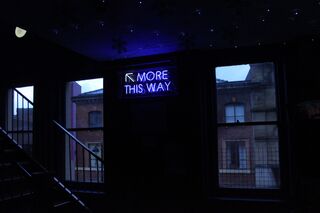Anxiety
“Give Me More"
Learn to enjoy positive anxiety in order to grow in your relationship.
Posted December 2, 2022 Reviewed by Hara Estroff Marano
Key points
- Relationships will quickly settle into a familiar homeostatic pattern.
- Once partners settle into a familiar dance, personal and relational change becomes difficult.
- This results in boredom and stagnation.
- The solution is to demand more of yourself, by learning to enjoy positive anxiety and blocking your usual defense strategies.
“There’s no growth in the comfort zone, and no comfort in the growth zone.”
We all have a relational "business card", the way we show up in relationships. That role will attract partners who like that act and want to be in a complementary relationship with us.
The result is that the people we attract to our lives are more or less happy with the way we bring ourselves to the encounter.

Relationships as Systems
In systemic therapy, relationships are seen as patterns. Once you start dating, your relationship settles into a homeostatic balance. The balance is a cocreated unconscious dynamic in which each partner plays their role over and over again. Generally, partners soon find themselves in complementary roles, such as pursuer/distancer, open/closed, shy/confident, adult/child and more. You can read more about the systemic dynamic of relationships here.
Problems start when one of partner wants to change the homeostasis.
Usually spouses demand change from their partner first. The requests for change usually don’t come from a deep curiosity for evolution of the relationship but from irritation with current behavior or attitude in the relationship.
Requests for change are commonly voiced as complaints—which rarely lead to real behavioral change. The couple will remain in the familiar homeostatic pattern.
Over time, if we are not really being challenged to grow, we end up staying more or less in the same role and the same dynamic. We may find ourselves saying and behaving in the same familiar way (what I call our “greatest hits”), and we sink into self-presentation in our intimate relationship. This inevitably leads to a feeling of boredom and stagnation.
What Is the Solution? Give Me More
When your partner says “give me more,” how do you understand that? Most of us have a core belief that “more” equals not good enough. But there’s another way to understand “more”.
“More” is key to the wonderful world of growth. Of exploration. Of change. You will need to rewire your brain and soften that core belief that more equals not good enough. You’ll have to choose to see “more" as an invitation to grow, as a celebration of your evolution.
If you want more from yourself, you’ll have to embrace (positive) anxiety and dare to change your role in your relationship. You’ll have to push beyond your defense mechanisms towards a new, sloppy dynamic. Positive anxiety, in contrast to negative anxiety, is the sense of being stretched beyond your comfort zone, when things aren’t familiar and you’re not really sure what’s happening. Positive anxiety is part of growing.
More Onstage and in the Clinic
As an improv teacher the word I say most often is “more”: “Give me more… Bigger.. louder… repeat it… I want to see more of that… raise your volume… be more physical…” This is my way of helping actors widen their abilities and repertoires.
As a therapist, I try to block my clients' exits by asking them to try new behaviors next to their partners. This is an invitation for them to bring more aspects of themselves to the relationship.
Why is it simpler for me to want more from you than your partner does? Because I’m not your partner, so I’m not part of your homeostasis. I’m not competing with you, I’m not threatened by your growth, and I have more flexibility in relating with you because we don’t share a history.
It's harder for us to want more from our own partners, kids, parents, and friends.
How to Demand More from Yourself
Many of us don’t have a "more" space in our lives. But with some awareness, you too can block your own exits and bring more of yourself.
- Reflect with your partner. Do you challenge each other to grow? Is there a “more” space in your relationship?
-
Block your exits. Call yourself out when you realize you’re hiding behind the same vague messages, defense mechanisms, or your other relational greatest hits.
- Increase positive anxiety. Join a class or group that stretches you. Find a mentor, friend, or therapist who isn’t scared of you or your growth, someone to keep it real with you. Ideally it would be your partner, but initially it's harder because they’re part of the existing homeostasis.
- Become anonymous. Find spaces where people don’t know (or care) about your history, so there's no prior expectation from you to be in a specific role.
- Aim for beginner’s humility (not knowing exactly what will happen). Familiarize yourself with positive anxiety. Reframe it as excitement and growth.
So the answer you should give when asked for more?
"Challenge accepted."
Create spaces where people want more from you and you want more from them. After all, there’s no comfort in the growth zone and there's no growth in the comfort zone.
References
Neill, J. R., & Kniskern, D. P. (Eds.). (1989). From psyche to system: The evolving therapy of Carl Whitaker. New York, NY: Guilford Press.




